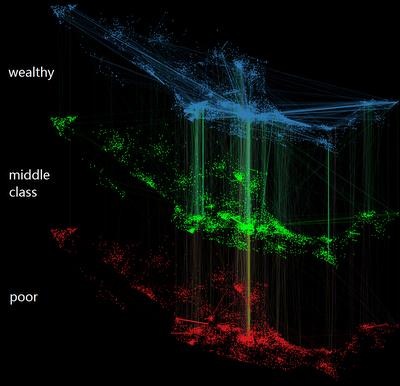
New big-data analytics by a City College of New York-led team suggests that both an individual’s economic status and how they are likely to react to issues and policies can be inferred by their position in social networks. The study could be useful in maximizing the effects of large-scale economic stimulus policies.
A team led by City College physicist Hernan A. Makse was legally granted access to two massive big datasets: all the phone calls of the entire population of Mexico for three months and the banking information of a subset of people. All the data, approximately 110 million phone calls and 500,000 bank clients, was anonymous with no names.
“It is commonly believed that patterns of social ties affect individuals' economic status, said Makse, whose research interest includes the theoretical understanding of complexity. “We analyzed these two large-scale sources – the telecommunications and financial data of a whole country's population. Our results showed that an individual's location, measured as the optimal collective influence to the structural integrity of the social network, is highly correlated with personal economic status.”
The social network patterns of influence observed mimicked the patterns of economic inequality. For pragmatic use and validation, Makse and his colleagues carried out a marketing campaign that showed a three-fold increase in response rate by targeting individuals identified by their social network metrics as compared to random targeting.
Makse’s collaborators included Shaojun Luo and Flaviano Morone from CCNY’s Levich Institute, and Matias Travizano and Carlos Sarraute from Grandata Labs in San Francisco.
Their paper, entitled: "Inferring Personal Economic Status from Social Network Location," appears in the journal “Nature Communication.”
About The City College of New York
Since 1847, The City College of New York has provided low-cost, high-quality education for New Yorkers in a wide variety of disciplines. Today more than 16,000 students pursue undergraduate and graduate degrees in eight professional schools and divisions, driven by significant funded research, creativity and scholarship. Now celebrating its 170th anniversary, CCNY is as diverse, dynamic and visionary as New York City itself. View CCNY Media Kit.